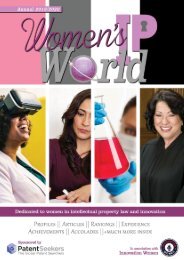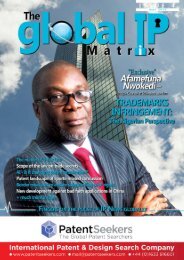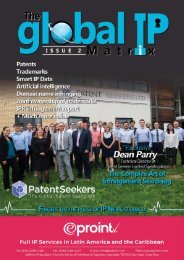Global IP Matrix - Issue 7
Dear readers, We sincerely hope that you are all in good health and keeping in good spirits during these undeniably uncertain times. We have all had to adapt to working out of our comfort zones, which I am sure has been very challenging at times for you all as it has been for us. However, we continue our quest to look to the future and deliver exclusive content to you, direct from thought leaders working at ground level in the IP industry from all over the world. Issue 7 of The Global IP Matrix magazine is packed with informative and exciting articles to keep you up to date and educated in what has been developing in the global IP industry during the past few months and into the future. We hope you enjoy reading our publication. We want to thank all our contributors for sharing their knowledge, opinions, and expertise in this new edition of the Global IP Matrix magazine. From all of us at The Global IP Matrix & Northon's Media, PR & Marketing Ltd
Dear readers,
We sincerely hope that you are all in good health and keeping in good spirits during these undeniably uncertain times. We have all had to adapt to working out of our comfort zones, which I am sure has been very challenging at times for you all as it has been for us.
However, we continue our quest to look to the future and deliver exclusive content to you, direct from thought leaders working at ground level in the IP industry from all over the world.
Issue 7 of The Global IP Matrix magazine is packed with informative and exciting articles to keep you up to date and educated in what has been developing in the global IP industry during the past few months and into the future. We hope you enjoy reading our publication.
We want to thank all our contributors for sharing their knowledge, opinions, and expertise in this new edition of the Global IP Matrix magazine.
From all of us at The Global IP Matrix & Northon's Media, PR & Marketing Ltd
Create successful ePaper yourself
Turn your PDF publications into a flip-book with our unique Google optimized e-Paper software.
In the
OCP, not all
licences are permitted.
In order to be compatible, the
licence must comply with the following
criteria: be available to the public; grant
all rights regarding the specific IP that is
being licenced; be royalty-free and fully
paid-up; must contain an obligation of nonexclusivity
nor seek judicial relief to use the
IP. Likewise, the licence must begin no later
than December 1, 2019, and until the World
Health Organisation declares the end of the
pandemic plus one year, provided it is not
prior January 1, 2023. An additional relevant
aspect is the field of use, which will imply that
the pledgor is free to grant any permissions
but should have as a minimum “the purpose
of diagnosing, preventing, containing, and
treating COVID-19”.
On the other hand, there are similar efforts
outside the OPC’s scope. These are the cases of
Medtronic, Abbvie, Fortrees Investment Group
LLC, Pfizer, and other laboratories. Likewise,
the United States Patent and Trademark Office
(USPTO) launched “Patents 4 Partnerships”,
an integrated platform in which individuals or
businesses willing to create solutions for the
eradication or treatment of COVID-19, can
easily search for patents or patent applications
whose owners have agreed to licence. Unlike
the OPC, the USPTO does not have –at the
moment– a standard licence agreement or
minimum requirements. In this case, parties
are responsible for their own negotiations and
terms in the licence agreement.
Licencing has always existed, but how
companies manage them in a worldwide
emergency crisis will be decisive for what
comes next. Society is attentive and will
support any business that aided in a way out
of this crisis. Thus, in these times, the way
companies oversee their licences must follow
a strategy that not only suits corporate image
and CSR, but that could show benefits for the
international community
as a whole. IP holders who
assume this type of
solution are likely to be
seen as the leaders who
helped undermine the
COVID-19 pandemic.
II. Licencing
agreements
From the above, it can be perceived how
important IP licencing agreements are. In that
regard, COVID-19 has taught us that nothing
is as predictable or resistible as one might
conceive. Certainly, the circumstances in
which we currently live can cause obligations,
such as compliance to a minimum sale,
production, or royalty requirements cannot
be fulfilled. This is the case of businesses that
have stopped operating or whose sales have
decreased. In these times, IP lawyers around
the world are reviewing agreements of affected
contractors and studying suspension or
excusable provisions such as a force majeure
clause.
In the best scenario that the licence agreement
contains a force majeure clause, it is vital
to analyse if a pandemic event is included
in the said provision. In general, it is likely
to be included since most (not all) of the
agreements state broad definitions such as
‘act of God, unforeseeable event or event
beyond the parties’ control’. Without a doubt,
the COVID-19 pandemic could fit this
provision. Similarly, it is important to note
if the obligation that wants to be suspended
is included in the said clause since possibly
it covers specific aspects only. Also, it should
be observed what steps should be taken to
implore the clause.
Notwithstanding the importance of this type of
provision, the number of contracts that omit it
would be surprising. In these cases, the parties
may refer to the common law of the country
that governs the contract. For instance, the
Dominican Republic’s case law has specified
that three cumulative requirements must
be met in order to consider an event as a
force majeure and consequently suspend
contractual obligations. That is, the event
must be: i) external (it does not depend on
the parties); ii) unpredictable (by the time the
licence was signed the event was unpredictable
by the parties); iii) irresistible (it means that
once the event has arrived, the licensee has
done everything reasonably possible to fulfill
his obligation and it has been impossible).
These three requirements must be connected
with the breach of the obligation in question.
Additionally, the above will be analysed
on a case-by-case basis, which eliminates
any guarantee of success. To illustrate, in
the Dominican Republic, the first case of
COVID-19 arrived in March 2020, hence
in the case of requirement number ii, if the
contract was signed in February 2020, it can be
said that the event was predictable. In that case,
COVID-19, in principle, would not qualify as a
force majeure event.
Although the general rules of law replace what
the parties do not contractually foresee, it is
known that open gaps translate in time, money,
and, above all, a detriment in the parties’ good
business relationship. It is expected that from
now on, as IP lawyers, nothing will be taken for
granted, and any slit in licencing agreements
will be permeated.
III. Trade secrets
COVID-19 has touched another aspect that
concerns IP, and that is trade secrets. This
includes all sensitive information, crucial for
the company’s development, such as sales
methods, a list of clients and suppliers, and
commercial strategies, among others. This
has always been an important point; however,
at the moment trade secrets are at higher risk
since due to the pandemic employees are
working remotely and using digital platforms
for virtual meetings
To avoid infringements to this important
corporate asset, companies must investigate
the data handling policy of each virtual
meeting platform. In this way, those that do not
have safe protection will be avoided. Likewise,
companies (regardless of their size) must
have a clear non-disclosure agreement, which
establishes what information the employee
can access, what to do, what not to do with
the confidential information and the legal
consequences in case of a breach. Similarly,
in remote work computers, access should be
limited only to the files that employees need,
according to their functions. Equally, it is vital
to have software to avoid cyber attacks. All
of these must go hand in hand with constant
communication and employee training.
Conclusion
Finally, it has been analysed how the current
pandemic has influenced IP in the fields of
counterfeiting, licence agreements, and trade
secrets. It has been shown that COVID-19
has allowed IP lawyers and IPRs holders
to witness the challenges that each of these
fields entails directly. Most importantly, it
has evidenced the improvements that must
be implemented in legal systems, how to
do business and the strategies that should
be taken to avoid infractions or to respond
to them. In the end, these lessons will
benefit not only IPRs holders but also the
international community as a whole.
www.gipmatrix.com
29












